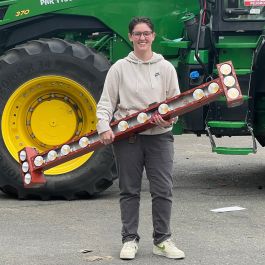Emily D’Arcy didn’t always know that she would find her place in agricultural technology. Her love for understanding how things work started young — taking apart gadgets, tools and anything she could get her hands on. However, it was at the University of Washington’s engineering college where her passion for technology truly took shape and began to align with her larger goal of making a positive impact on society.
D’Arcy's interest in engineering was driven by her desire to contribute something meaningful to the world — and in her case, that meant focusing on agriculture.
“I wanted to create a lasting and positive impact on our agricultural society through engineering,” she said. But that vision came with questions of its own.
“What specific problems did I want to solve? How could I bring new ideas to old issues such as protecting soil health?” D’Arcy recalled asking. “Through trying many different engineering clubs, talking to professors and meeting with advisors, it became clear that mechanical engineering provided me with a broad understanding of how to take on the issues that I wanted to face.”
Ultimately, she found her specific passion: "I wanted to focus on eliminating pesticides and increasing healthy crop yields.”
This goal resonated perfectly with her current role as a mechanical engineer at Carbon Robotics, where she contributes to the creation of cutting-edge solutions like the world’s first laser weeder — technology designed to eliminate weeds while maintaining soil health.
Behind the Tech: The LaserWeeder
D’Arcy’s work at Cabon Robotics helped create the LaserWeeder, an AI-powered machine that utilizes computer vision to identify weeds and discern them from crops in real time, killing the weeds with a high-powered laser that burns it as the machine sweeps over the field.
The alignment between the company’s goals and her personal passion for contributing to a larger mission of empowering farmers and improving the sustainability of agriculture made the role a perfect fit.
Built In Seattle heard from D’Arcy about how she continues to use her engineering skills to make a difference through her role at Carbon Robotics and what advice she has for early-career engineers.
What is your current role? What first sparked your interest in that field?
My current role is mechanical engineer at Carbon Robotics — an agricultural tech company that created the world's first laser weeder. When first looking for technical roles out of college, I was drawn to Carbon Robotics’ mission of eliminating weeds and empowering farmers to maintain healthier soil and crops — something entire communities can benefit from. I’m deeply passionate about harnessing engineering prowess for positive change, and I thought what better way to contribute than to join Carbon!
“I was drawn to Carbon Robotics’ mission of eliminating weeds and empowering farmers to maintain healthier soil and crops — something entire communities can benefit from.”
How did mentors, networks or programs help you advance your interests and profession?
The networks that I found early on in my career as an engineer were essential to my growth and the mindset that I continue to develop today. In college, I got involved with the Society of Women Engineers and the American Society of Engineers, both of which connected me with seasoned engineers who I could lean on.
I encourage early-career professionals to find groups similar to these in their own fields. It was incredible to see how many doors opened for me after I introduced myself to these groups. I would not have known about Carbon Robotics if I hadn't taken the risk of putting myself out there and introducing myself at various networking functions. Don't be afraid to cold-email or reach out to folks that you're inspired by! You never know how you could help them as much as they could help you.







